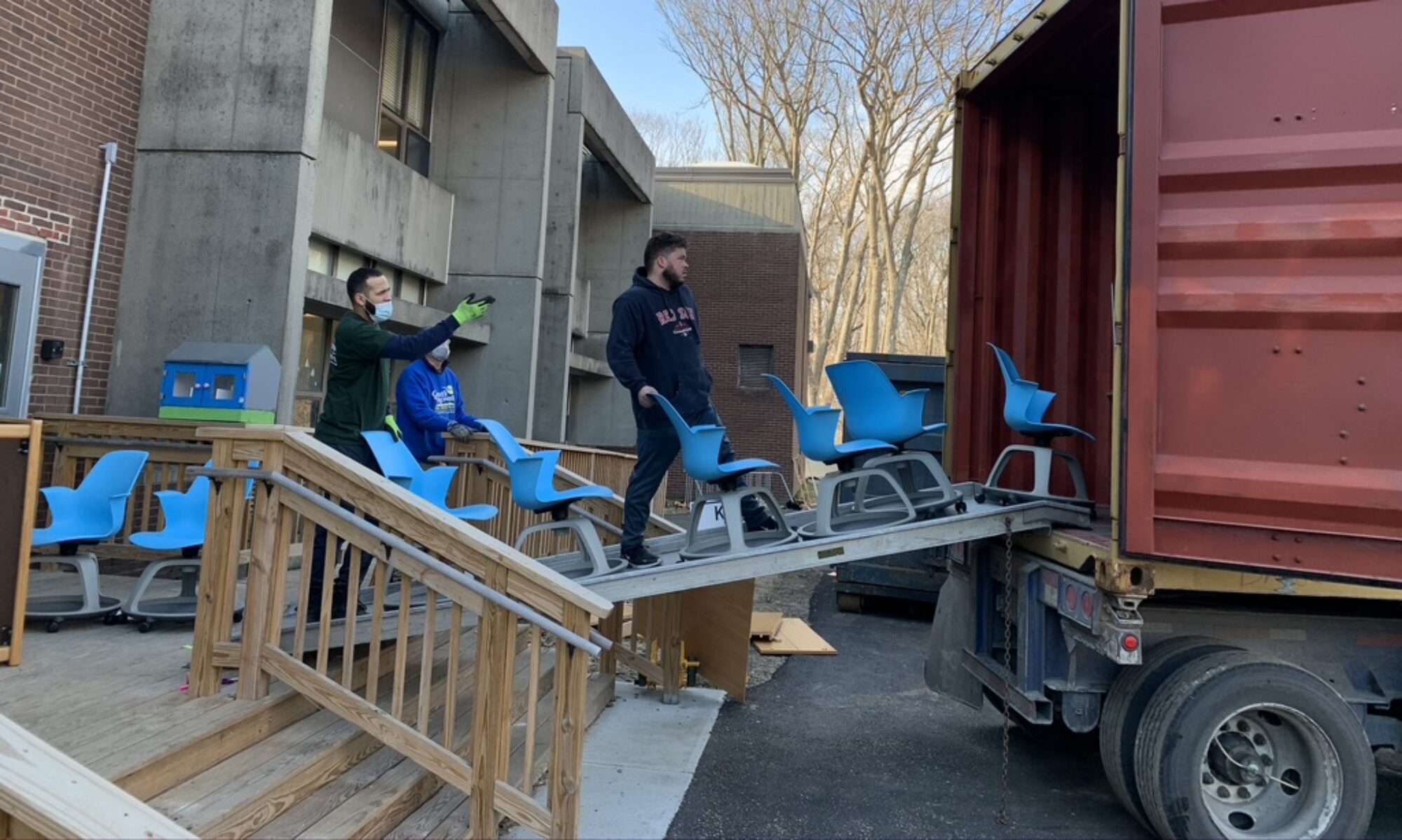This spring Boston University passed a major milestone. In the past ten years, BU has provided more than 1.5 million pounds of surplus furniture and equipment to charities.
BU is one of IRN’s original members. We’ve been working together since IRN was founded at the end of 1999. A couple of years later, in 2002, BU asked IRN to help with excess furniture and equipment – all the desks and file cabinets and beds and bureaus and thousands of other items that BU could no longer use.
At that point, almost all of BU’s surplus was being tossed into its dumpsters, as it had been for decades – and as still happens on most college campuses. That first year, BU collected 10,000 pounds of surplus, not even a single truckload. IRN matched most of it with charities, and recycled the remainder that was unfit for reuse.
From that beginning, BU’s surplus management program with IRN has grown to the point that, in 2011 alone, the school recovered more than 525,000 pounds of surplus. Currently over 96% of the BU surplus is reused through IRN’s network of charitable partners, and almost all of the rest is recycled for its commodity content. Virtually nothing is landfilled. Here’s the ten-year track record:
Year Surplus Recovered (Lbs)
2002 9,800
2003 14,600
2004 18,800
2005 170,300
2006 30,100
2007 83,200
2008 128,300
2009 202,300
2010 342,000
2011 528,000
Ten Year Total 1,527,400
Back in 2002, when we started looking into BU’s waste stream we realized that there are two major sources of surplus on campus. The first comes from replacements and cleanouts: replacements when BU purchases new dorm or classroom furniture, cleanouts when the school tears down or renovates. The second consists of surplus that’s generated in small quantities every single day: a couple of desks from an administrative office, a few beds or mattresses, two or three filing cabinets, the leftovers when a professor cleans out an office or lab.
Reflecting that pattern, since 2005 BU’s surplus program has had two main tracks.
One works out of a parking lot in Boston’s Back Bay, central to BU’s campus. There we parked two storage trailers. Any time a department gets rid of some surplus, BU’s facilities staff puts the surplus into a trailer instead of the trash. When the trailer is full, IRN cleans it out, takes the surplus to our warehouse, and makes a match with our network of charities. This steady program has kept more than 400,000 pounds of BU surplus out of the trash.
The second track handles large replacements and cleanouts. This surplus has come from many departments on campus; the most active has been BU’s Housing Department. When BU renovates a dorm or buys new furniture, IRN identifies a charity that can use the surplus in relief or development projects. IRN then arranges movers to come on campus and load the old furnishings into trailers (for U.S. charities) or shipping containers (for overseas shipment). Once packed at BU, the trailers are not unsealed until they reach their final destination. This program has provided over a million pounds of furniture and equipment to worldwide charities.
And then there are things like the basketball floor. For 30 years the floor at BU’s Brown Arena hosted the likes of Rick Pitino, Mike Krzyzewski, Reggie Lewis, and Grant Hill. When BU built their new Agganis Arena, they kept the old floor in storage. But eventually they needed the storage space, and the old floor needed to disappear. IRN placed a call to nonprofit partner Food for the Poor, and FFTP identified a school outside of Kingston, Jamaica. The school had a gym but no floor; BU had a floor with no gym. It was a perfect fit. BU packed the floor into two shipping containers, and three weeks later it was installed and being used by school kids in Jamaica.
Jeanne Sevigny is Assistant Director of BU Housing. She says: “This started out as a good idea for recycling our unwanted furniture, but as we became more connected with IRN and their charitable network the social benefits of the program really grabbed our hearts. For those of us in Housing and Sustainability, we could not be more pleased. We are doing the right thing environmentally and socially, and the costs related to this program are far less than disposal – a real win-win situation all around.”
Given such successes, BU is recognized as a leader nationwide in surplus property management. Mike Lyons of BU’s Purchasing Department sums it up: “The days are long gone of filling dumpsters with materials that could have a second life. It is not just about furniture. It’s about doing the right thing for the environment, the right thing for people, and the right thing for BU.”
